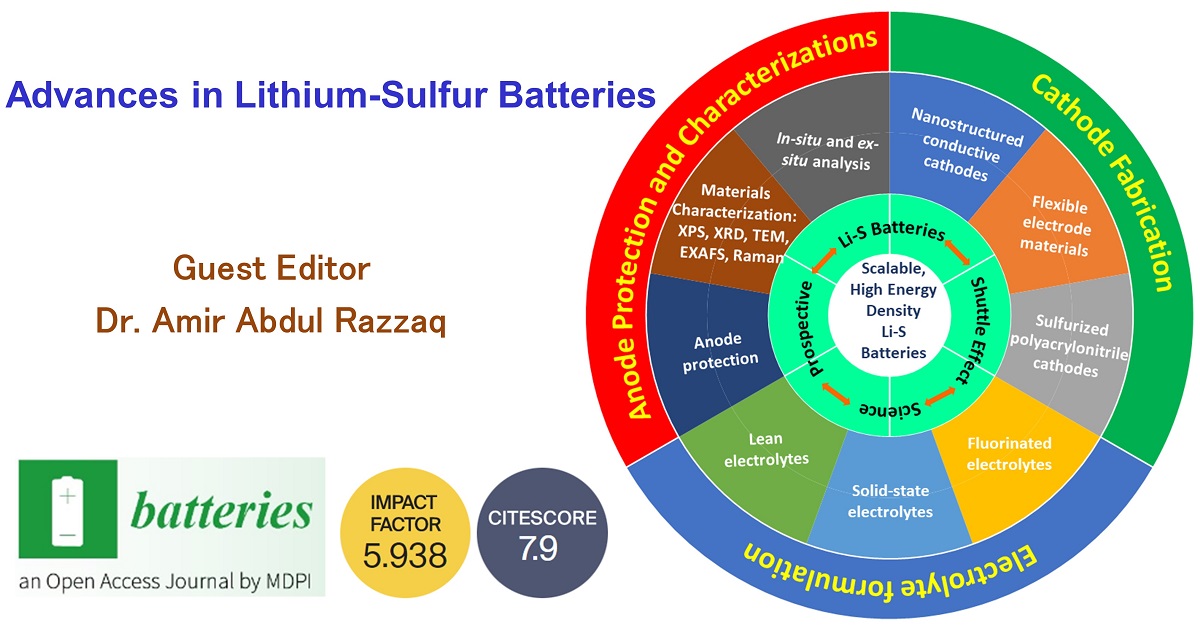Advances in Lithium-Sulfur Batteries
A special issue of Batteries (ISSN 2313-0105). This special issue belongs to the section "Battery Materials and Interfaces: Anode, Cathode, Separators and Electrolytes or Others".
Deadline for manuscript submissions: closed (20 July 2023) | Viewed by 344

Special Issue Editor
Special Issue Information
Dear Colleagues,
Rechargeable lithium–sulfur (Li-S) batteries represent an attractive, “beyond Li-ion” battery technology because they offer a high specific energy of 2,500 Wh/kg at the material level and 550 Wh/kg at the cell level. However, Li–S batteries face substantial technical challenges that have, thus far, prevented the realization of the battery’s tremendous performance potential. It is important to design and fabricate next-generation Li–S batteries that improve the energy density in order to improve the performance of technologies that utilize Li–S batteries, such as electric vehicles, robots, and Internet-of-Things (IoT) devices.
I am open to receiving submissions on these topics:
- High-energy Li–S batteries;
- Flexible Li–S batteries;
- Sulfurized polyacrylonitrile cathode in Li–S batteries;
- Solid-state Li–S batteries;
- Anode protection in Li–S batteries;
- Advanced and lean electrolytes in Li–S batteries;
- Redox reaction mechanisms via in situ and ex situ studies in Li–S batteries.
Dr. Amir Abdul Razzaq
Guest Editor
Manuscript Submission Information
Manuscripts should be submitted online at www.mdpi.com by registering and logging in to this website. Once you are registered, click here to go to the submission form. Manuscripts can be submitted until the deadline. All submissions that pass pre-check are peer-reviewed. Accepted papers will be published continuously in the journal (as soon as accepted) and will be listed together on the special issue website. Research articles, review articles as well as short communications are invited. For planned papers, a title and short abstract (about 100 words) can be sent to the Editorial Office for announcement on this website.
Submitted manuscripts should not have been published previously, nor be under consideration for publication elsewhere (except conference proceedings papers). All manuscripts are thoroughly refereed through a single-blind peer-review process. A guide for authors and other relevant information for submission of manuscripts is available on the Instructions for Authors page. Batteries is an international peer-reviewed open access monthly journal published by MDPI.
Please visit the Instructions for Authors page before submitting a manuscript. The Article Processing Charge (APC) for publication in this open access journal is 2700 CHF (Swiss Francs). Submitted papers should be well formatted and use good English. Authors may use MDPI's English editing service prior to publication or during author revisions.
Keywords
- high energy
- flexible
- sulfurized polyacrylonitrile
- solid-state
- in situ
- ex situ
Benefits of Publishing in a Special Issue
- Ease of navigation: Grouping papers by topic helps scholars navigate broad scope journals more efficiently.
- Greater discoverability: Special Issues support the reach and impact of scientific research. Articles in Special Issues are more discoverable and cited more frequently.
- Expansion of research network: Special Issues facilitate connections among authors, fostering scientific collaborations.
- External promotion: Articles in Special Issues are often promoted through the journal's social media, increasing their visibility.
- Reprint: MDPI Books provides the opportunity to republish successful Special Issues in book format, both online and in print.
Further information on MDPI's Special Issue policies can be found here.





